#bird perch
Explore tagged Tumblr posts
Text
The wooden sonic bird perch, would you buy it?


#izztreme#sonic the hedgehog#classic sonic#birds#bird perch#ai redraw#giving these generated images a true soul#artist vs ai#just a drawing
3 notes
·
View notes
Text

I love "product images". Who tf is keeping blue jays and blue birds, and where do they live? Because it's illegal where I live. (Joking. Wild animals DO NOT make good pets. I even question keeping skunks. De-scented or not.)
Feel free to add your own.
#not art#shopping apps#bird perch#I was looking for perches for budgies on Chewy#because they chewed up the ones they already have#Please DO NOT keep wild birds as pets#My birds are probably going to chew this up as well
2 notes
·
View notes
Note
I remember you said you thought Arthur would be great with foster kittens, and you were so right.


A lot of people don’t know this but actually he is a single mom
#ignore the bottom of the bird perch :(#I can’t keep newspaper on it bc Bianca just plays in it and tears it up#ask#Arthur#bug
4K notes
·
View notes
Text
Northern saw-whet for Superb Owl Sunday

#Superb Owl#SuperbOwl#owl#northern saw-whet owl#saw-whet owl#saw-whet#rosy maple moth#owl perch#small owl#painting#watercolor#owl art#owl illustration#illustration#the forest revealed#forest#bird#animal#wildlife#maine#maine birds#jada fitch#artist#illustrator#watercolor painting#watercolor illustration#animal illustration#wildlife art#wildlife artist#audubon
927 notes
·
View notes
Text


small and clingy
#idk whats going on in the first one sqh is just chilling. perched on his shoulders like a weird bird#scum villain self saving system#svsss#shang qinghua#mobei jun#moshang#my art#sqh face in the second one is everything to me help... the blorbus dingus silly you are#i want mbjs cloak to just be so big. so long. it needs to engulf them both fully. it needs to drag behind him.#an attempt at yellowhua cus i love him dearly n i like the idea of them wearing eachothers color weh#i will go a month without drawing anything and then randomly draw for days in a row help
1K notes
·
View notes
Text


resident (white breasted) nuthatch checking out the wildlife camera... he had a feather out of place for a couple weeks so we could tell it was always him doing all the ridiculous shit like this
#birblr#white breasted nuthatch#nuthatch#birds#nature#wildlife#ornithology#wild birds#birdwatching#bird photography#trail cam#abstract perches
1K notes
·
View notes
Text

green heron & yellow perches
#green heron#my art#illustration#digital illustration#digital art#bird art#procreate#bird illustration#digital painting#fish art#yellow perch#fish illustration
4K notes
·
View notes
Text
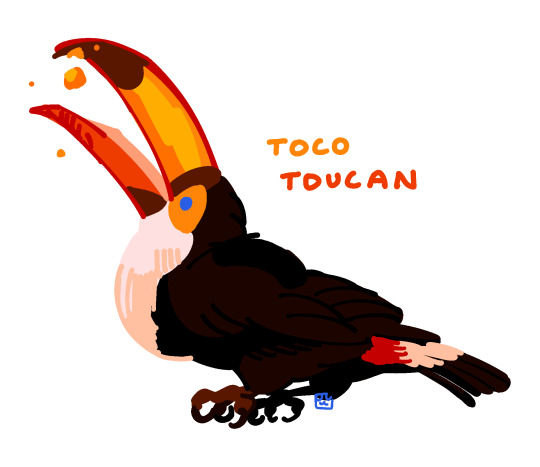
Toco Toucan
(Rhamphastos Toco)
#still working on the site including a tagging index for different types of birds but im kinda stuck on how to organize it#if i go by order name i guess that could work but idk if id be able to remember to type each name every time#like... maybe i could do aquatic birds perching birds birds of prey etc..????#whatever heres a toucan#toco toucan#mspaintbirdies#my art#myart#birds#ornithology#nature#illustration
1K notes
·
View notes
Text
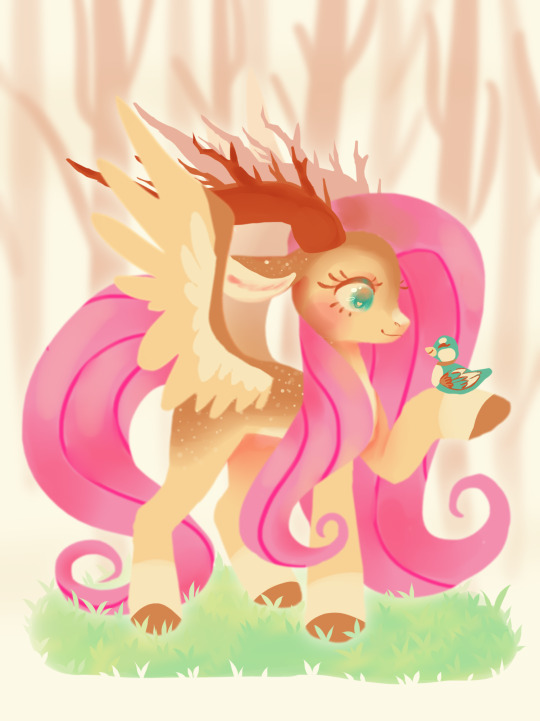
my fluttershy redesign x3
#she's like half deer half pony? something like that#she used to feel extremely self anxious becuase of her antlers#but she realised that birds love to perch on them!!!#i kinda rushed this so i forgot to draw them#WAIT I FORGOT TO DRAW HER CUTIE MARK!! NOOO!!! :(#oh well#i wanted to draw this redesign for like a month now i think#yay :3#art#digital art#mlp#mlp fim#my little pony#friendship is magic#mlp g4#mlp:fim#mlp art#fluttershy#mlp fluttershy#fluttershy mlp#artists on tumblr#artwork#mlp redesign#redesign#fluttershy redesign
1K notes
·
View notes
Text
qPhilza perching on people because bird
qFit: Mans is built like a brick shithouse—he can totally balance Phil’s additional weight. The first attempt is a bit shaky, sure, but nowadays Phil swoops down or hops up onto Fit’s shoulder and all Fit really has to do is jut out his elbow to give his friend a little more space for his talons to work with. Bam, he’s perched. Works out about 9.9 times out of 10, though Phil delights in trying to catch him off guard.
qEtoiles: He doesn’t have Fit’s bulk on his side, so he’s not as sturdy, but he is strong. The landing is usually a little rough since Etoiles has to work a bit harder to counterbalance the additional weight, but he always finds that center of gravity in no time flat. Phil usually perches with one talon on each of Etoiles’ shoulders since he’s not as w i d e, just so Phil can have a little extra grip. At some point, Etoiles tries fighting a mob while Phil is perched on him, and that goes exactly as well as you would expect.
qForever: Honestly, with all of the hard labor Forever does for his big builds, Phil was expecting him to do better, but the first (several) attempts end up with Forever stumbling over and knocking Phil off of him from his wild arm-pinwheeling. They eventually figure out it’s more doable if Forever himself has something to lean on (a wall, a chair, the butt of his pickaxe) and Phil puts one talon evenly spaced on each shoulder. Phil learns some new swears in Portuguese in the process.
qMissa: Flattened. Full-on face in the floor, mouth full of grass, wind knocked out of his lungs at Mach 5 the first time Phil tries. Phil apologizes profusely, but Missa—once he can breathe again—just rolls over onto his back and asks Phil if they can give it another try. It takes a long, LONG time, but they figure out that if Phil plants his talons on Missa’s shoulder pads and leans forward while Missa leans back, they have a small little window of time where they achieve balance. The best part? Phil gets a perfect view of Missa’s goofy little grin every single time.
#q!philza#idk what possessed me to write this i just think it’s funny#bird man perching on his friends/loved ones is so special to me actually#if you’re wondering how any of them could take the weight of a full grown man uhhhhhh bird bones. they hollow. yeah.#dont mind me im just rambling#qsmp philza#codebreakers#codebreaker duo#anarchy duo#sugar duo#death duo#pissa#(<-implied)#my writing
3K notes
·
View notes
Text
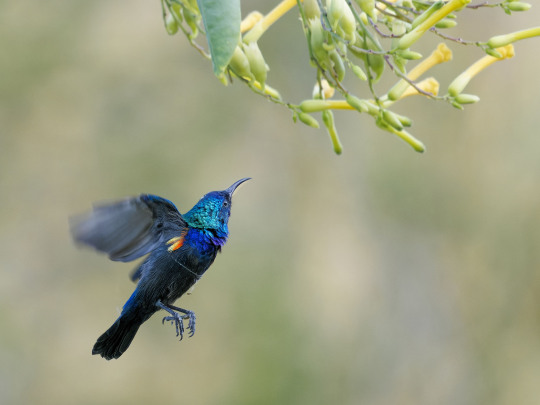
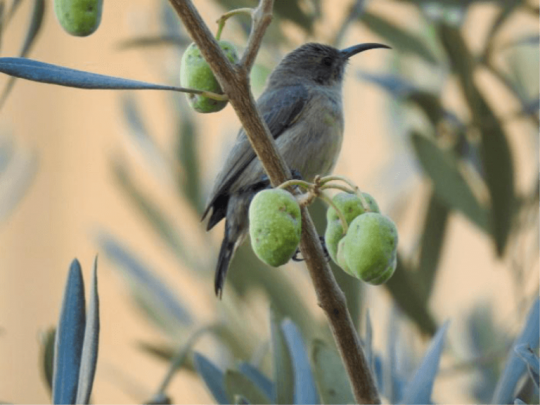
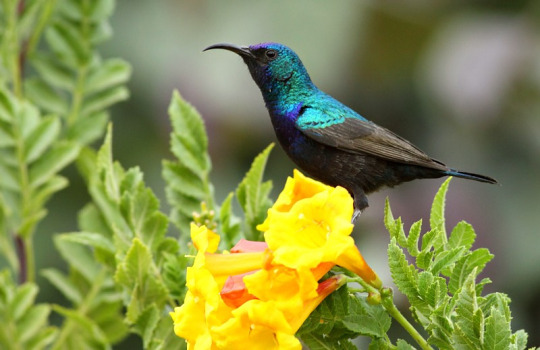
The Palestine Sunbird Persists
The Palestine sunbird, also known as the orange-tufted sunbird (Cinnyris osea) is the national bird of Palestine, and often seen as a symbol of resistance and hope. This species occurs in dry climates, particularly desert, scrubland, and savannahs, but can also be found in orchards and gardens where flowers are abundant. In addition to the Levant, C. osea occurs throughout the southwest cost of Saudia Arabia and the coasts of Yemen and Oman in the south.
C. osea is a small bird, 8 to 12 cm (3.1-4.7 in) long with a wingspan of only 14 to 16 cm (5.5-6.2 in). Males weigh on average 7.6 g (0.26 oz) and females are slightly smaller, at about 6.8 g (0.24 oz). Males are quite easy to identify due to their striking plumage; their feathers are iridescent, appearing dark until they shimmer glossy blue or green, with orange tufts at the side of the breast. In contrast females are fairly drab; grey-brown with a lighter underside. The beaks of the Palestine sunbird are also noted for their distinctively long and curved, which they have developed to efficiently feed on nectar.
Although not directly part of the hummingbird family, the Palestine sunbird shares many similarities with the group. Its diet consists of nectar, and is supplemented with insects. Their tongues are long, and brush-like, and the shape of their beak allows them to reach down to the base of the flower. For flowers that are , they will use their sharp beaks to pierce the side and access the nectar directly. All this is done at very high speeds, but unlike hummingbirds the Palestine sunbird cannot hover in place, and must land in order to feed. Because of their primary reliance on nectar, the orange-tufted sunbird is an important pollinator in its native region. Adults are rarely predated upon, but eggs and young are often targets for lizards, snakes, and birds of prey.
Reproduction begins in June, and continues through October. Males establish and defend territories, and court females by singing to attract a potential mate, then chasing her until she perches to signal her acceptance. Following the pairing, the two construct a purse-like nest, sometimes with a porch-like structure, that hangs from a branch. In this nest, 1-2 eggs are laid, and are incubated primarily by the female, while the male provides her food. The eggs take 13 to 14 days to hatch, and chicks are taken care of by both parents for an additional 14 to 21 days. Individuals can live up to 5 years in the wild.
Conservation status: The Palestine sunbird has a large range and population, and is thus considered Least Concern by the IUCN. Its primary threat is habitat loss due to agriculture and urban development.
If you send me proof that you’ve made a donation to UNRWA or another organization benefiting Palestinians, I’ll make art of any animal of your choosing.
Remember, the donation can be in any amount– every dollar counts!
Photos
Jorrit Vlot
Dula Alhashimi
Rana Hijawi
#Palestine sunbird#Passeriformes#Nectariniidae#sunbirds#perching birds#birds#deserts#desert birds#scrubland#scrubland birds#savannah#savannah birds#urban fauna#urban birds#middle east#animal facts#biology#zoology#ecology#free palestine
1K notes
·
View notes
Text

#HighPerch
Mountainous Parts of the Northern Hemisphere.
@BenAdrienProulx September 12, 2024.
#High Perch#Solar Panels Canada#Near the Hedge#High Above#Silent Hill#Wilderness Need Protection#IUCN#International Union for Conservation of Nature#ECCC#Environment and Climate Change Canada#Count Feeder Birds for Science#NCC#Nature Conservancy of Canada#Raw Nature#Nature Photography#Nature Canada#Wildlife Photography#Mountainous Parts of the Northern Hemisphere#Canada#Mohawk Native Reserve#The RavenKeeper
362 notes
·
View notes
Text

Itombwe Owl (Tyto prigoginei)
#Itombwe Owl#Tyto prigoginei#owl#Tyto owl#tyto#Congo Bay Owl#Phodilus prigoginei#painting#watercolor#rare owl#rare bird#African owl#Strigiformes#African Bay owl#jada fitch#illustration#art#watercolor painting#birds#bird#bird art#bird illustration#bird illustrator#Audubon#artist#bird artist#owl art#owl illustration#perched#endangered owl
199 notes
·
View notes
Text


Explorer au meets trolls world tour
This is the current final post since I don't have anything else ready and or queued up XD
Jade finds herself separated from her family and looking for a way back, the world is big and dangerous so she becomes a bounty hunter as a means of assisting her search, she thinks she's getting close when a world shaking tour and an interesting bounty fall on her plate.
Branch (since this is still within the N2 au just shifted a bit) has been living with Floyd so he's changed a bit, he tried to give himself bangs, which didn't work out, and he now wears a brown tunic under his leaf vest, a gift from another person who helped him and floyd out, a secret someone yet to be revealed teehee.
Poppy is mostly unchanged, as most of the N2 au effects Brozone, tho she is a bit closer with Branch than in canon due to circumstances!
#trolls#dreamworks trolls#trolls world tour#broppy#trolls branch#trolls poppy#trolls au#twt#n2 au#n2 explorer au#trolls oc#trolls oc jade#trolls hickory#i realized like forever after i made jades design and stuff#that she resembled Valka in terms of the skull mask and her general story#and i was like damn my httyd hyperfixation is making out with my trolls one#they even have a staff#and a skull mask#tho valkas i think is different#Jades is for blending in#scaring her marks#and is a trophy#its the skull of the bird that took her leg#her staff acts as a perch or a grabber for something teehee#but yeah i didnt notice the similarities until way later#it was unintentional#but its fun#its still dreamworks#the same thing happened when i realized branchs outfit is similar to shreks#leaf vest over brown shirt lmao
229 notes
·
View notes
Text

#IFTTT#Flickr#superbfairywren#maluruscyaneus#superb#fairywren#malurus#cyaneus#shepherdsbush#melbourne#victoria#australia#shepherds#bush#bird#wild#wildlife#animal#nature#canon#2021#r5#stick#perch#forest#tree#jonodashper#jonathondashper#wildlifephotography#naturephotography
572 notes
·
View notes
Text

Noor (a cutie) and Ben (also a cutie)
#giant tiny#gt#g/t#ocs#ben#giant tiny fluff#gt fluff#gianttiny#size difference#he…he perch her like a lil bird#gt community#sfw gt#gt sfw#giant robot#giant#giantess#my art#art#illustration#bird
267 notes
·
View notes